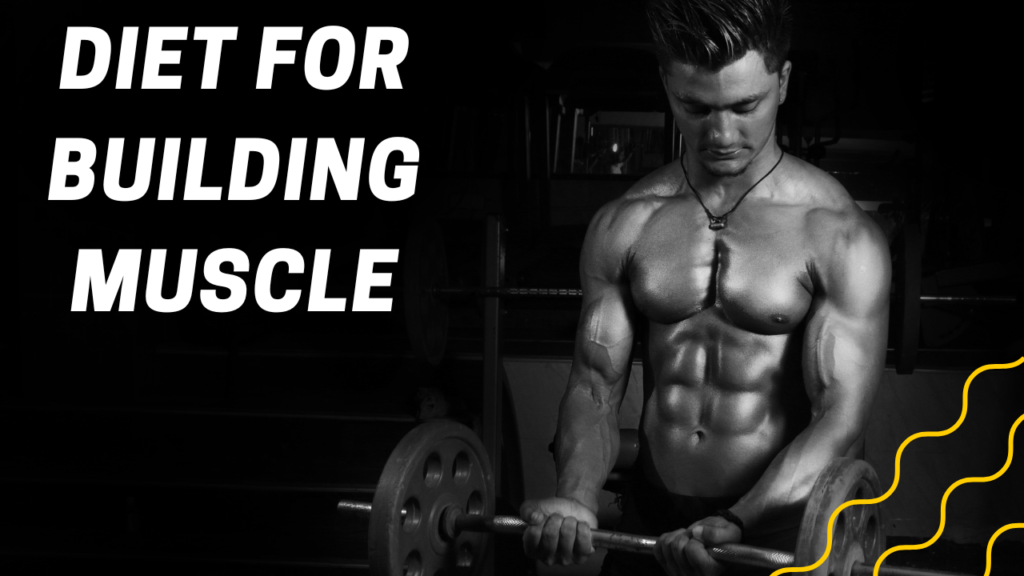Building muscle includes more than weightlifting. While training is fundamental for muscle development, diet is as important in guaranteeing that muscles develop and regrow as well. A muscle-building diet is crucial for giving the body the fuel and supplements it expects to boost strength and invigorate muscular hypertrophy (development). Whether you’re an accomplished weight lifter or a beginner needing to increase muscle mass, understanding the importance of a muscle-building diet is fundamental.

The Function of Macronutrients in Muscle Growth
Consuming the appropriate macronutrient balance—proteins, carbs, and fats—is critical for healthy muscle building. Each macronutrient plays a specific role in muscle healing, growth, and energy levels.
- Protein
individual to build muscle—1.6 to 2.2 grams per kilogram of body weight each day. High-quality protein sources include Protein, which is certainly the most important macronutrient for muscular building. Muscles are mostly made up of proteins, and eating enough of them helps repair muscle fibers that have been injured during strength training. Athletes often need more protein than the normal following:
Lean meats (chicken, turkey, and beef).
Fish: salmon, tuna, tilapia.
Eggs and dairy products (milk, Greek yogurt, cottage cheese).
Plant-based alternatives include tofu, tempeh, beans, lentils, and quinoa.
Consistent protein consumption throughout the day, ideally at each meal and snack, keeps the body in a positive nitrogen balance, which is required for muscle repair and growth.
- Carbohydrates
Carbohydrates are the body’s major energy source, particularly during high-intensity workouts. Consuming enough carbohydrates not only gives you energy to lift, but it also replenishes glycogen stores in your muscles after a workout, which helps with recuperation. Complex carbs are necessary for muscle growth because they provide prolonged energy release. Good sources of complex carbohydrates include:
Whole grains include brown rice, oats, quinoa, and whole wheat pasta.
Starchy veggies including sweet potatoes, squash, and maize.
Legumes include beans, lentils, and chickpeas.
Fruits: bananas, berries, apples.
A muscle-building diet should include carbs in every meal, especially after exercise when glycogen stores are depleted. Following an exercise, consuming a combination of protein and carbohydrates can help with recuperation and muscular building.
- Fats
Healthy fats have an important role in hormone production, particularly testosterone, which is required for muscular development. Fat is also a rich source of energy, which is useful when you want to eat more calories for muscle gain without increasing your food intake significantly. Healthy fat sources include nuts and seeds (such as almonds, walnuts, chia seeds, and flaxseeds), avocados, olive oil, and coconut oil. Fatty fish (salmon, mackerel, and sardines).

The importance of caloric surplus
To build muscle mass, you should ingest a larger number of calories than you burn. This excess ought to be restricted, as such a large number of additional calories can bring about excess fat increase as opposed to muscle building. An excess of 250-500 calories each day is frequently prompted for muscle building, however, this could shift in light of an individual’s digestion and training. It is essential to see your progress and adjust your calorie consumption in view of changes in body composition. On the off chance, if you’re gathering a lot of fat, you need to cut your calorie consumption. In the event that you’re not seeing any muscle gain, you might have to increase the intake.

Meal Timing for Maximum Muscle Growth
Meal timing is critical for muscle-building and strengthening. While overall calorie and protein consumption is the most important thing, scheduling meals around your time of training can improve performance.
Pre-workout Nutrition
A pre-workout meal should be based on carbs for energy and modest protein for muscle protection. Eating 1-2 hours before an exercise so that your body has enough food to operate optimally. A nutritious pre-workout lunch could include
- Grilled chicken with brown rice and vegetables.
- Smoothie with protein powder, oats, and bananas.

Post-workout Nutrition
After exercise, your muscles are in recovery mode and require protein to repair. Furthermore, replenishing glycogen stores with carbohydrates is critical for recovery. A post-workout diet should contain a protein and carb source within 30-60 minutes of finishing the workout. Examples include
- A protein smoothie served with a slice of fruit.
- Turkey sandwich with whole grain bread turkey sandwich with whole grain bread

Hydration and Supplements
Maintaining hydration is essential for muscular function and recovery. Dehydration can reduce strength, increase fatigue, and slow muscle recovery. Drink plenty of water throughout the day, and especially around workouts.
A well-balanced diet and supplements, such as whey protein, creatine, and branched-chain amino acids (BCAAs), can help muscle growth. Whey protein is a fast-digesting protein source ideal for post-workout recovery, while creatine is a popular supplement that improves strength and power output during workouts.




